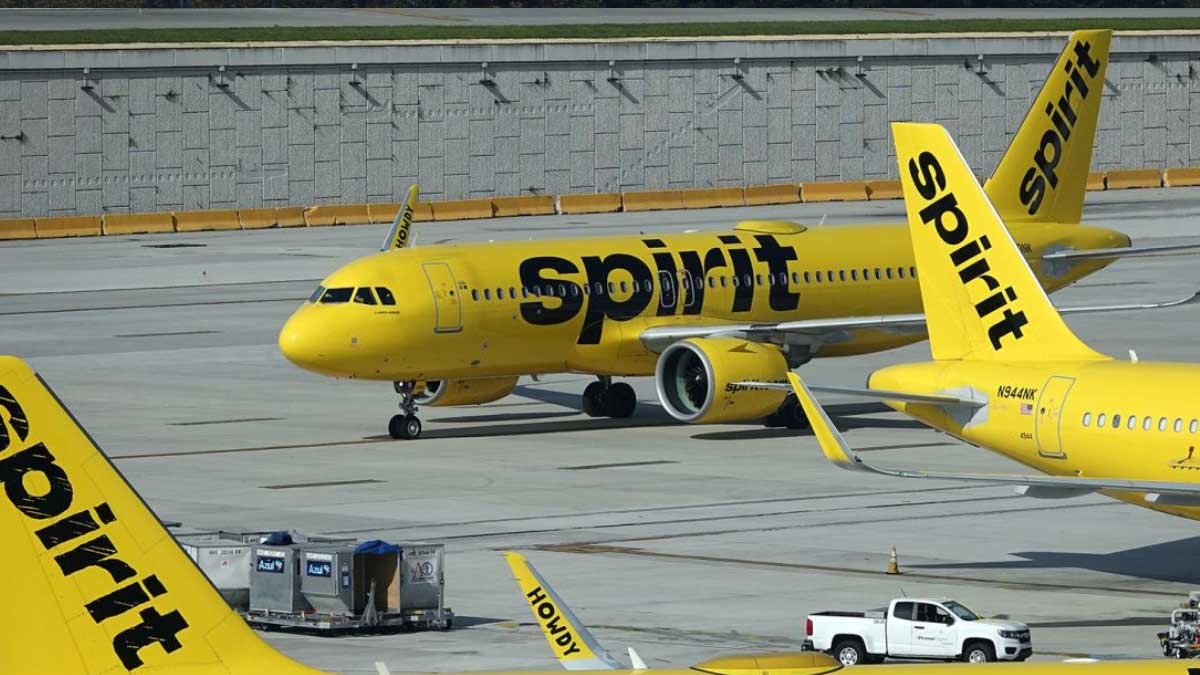- Home
- Billionaires
- Investing Newsletters
- 193CC 1000
- Article Layout 2
- Article Layout 3
- Article Layout 4
- Article Layout 5
- Article Layout 6
- Article Layout 7
- Article Layout 8
- Article Layout 9
- Article Layout 10
- Article Layout 11
- Article Layout 12
- Article Layout 13
- Article Layout 14
- Article Sidebar
- Post Format
- pages
- Archive Layouts
- Post Gallery
- Post Video Background
- Post Review
- Sponsored Post
- Leadership
- Business
- Money
- Small Business
- Innovation
- Shop
Recent Posts
Spirit Airlines Shares Drop 30% as Bankruptcy Looms

Shares of Spirit Airlines plummeted by over 30% on Friday, marking one of the worst trading days in the company’s history. This plunge comes amid reports that the low-cost airline is considering filing for bankruptcy, following a series of financial and operational challenges that have left the airline struggling to stay afloat. The company’s stock dipped to around $1.50 by mid-morning, continuing a downward spiral that began in premarket trading. This latest drop represents Spirit’s most significant loss since earlier this year when a federal judge blocked its proposed merger with JetBlue Airways, which was valued at $3.8 billion.
Spirit’s financial woes have been mounting ever since the collapse of its deal with JetBlue, which was expected to help solidify the airline’s position in the competitive budget travel market. The merger, if successful, would have consolidated Spirit’s operations with JetBlue’s, creating a more formidable competitor against the industry’s major players like American Airlines, Delta, and Southwest. However, the Department of Justice intervened, arguing that the merger would reduce competition in the budget airline sector and lead to higher prices for consumers. This ruling marked a significant setback for Spirit, which had been counting on the merger to help it overcome its financial challenges.
The failed merger left Spirit scrambling to find alternatives. According to a report by the Wall Street Journal, the airline has been in discussions with its bondholders about the possibility of filing for bankruptcy. These talks suggest that Spirit is exploring its legal and financial options as it grapples with a massive debt load and shrinking revenue. The airline has reportedly been trying to restructure its debt in order to avoid bankruptcy, but those efforts have stalled in recent months.
Analysts have expressed concern about Spirit’s ability to survive without filing for bankruptcy protection. Savanthi Syth, an analyst with Raymond James, noted in a report on Friday that Spirit may be able to renegotiate with its creditors outside of bankruptcy, but warned that the airline’s ability to maintain its low-cost model is in jeopardy. Syth’s note pointed out that the company faces significant challenges in managing its operating costs and revenue streams without the financial cushion that bankruptcy protection might provide.
Spirit’s financial challenges extend beyond the failed merger with JetBlue. The airline had previously attempted to merge with Frontier Airlines in a $6.6 billion deal announced in February 2022. That deal ultimately fell through when JetBlue offered a higher valuation for Spirit, leading to a bidding war that culminated in the eventual failure of both mergers. Frontier, like Spirit, operates as an ultra-low-cost carrier, and a merger between the two would have created a dominant player in the budget airline sector.
Despite these setbacks, Spirit’s management has maintained a relatively optimistic public stance. Ted Christie, Spirit’s CEO, told shareholders in June that he was “encouraged” by the company’s post-merger plans, even going so far as to deny that the airline was considering bankruptcy at the time. Christie emphasized that Spirit was taking steps to increase capital and cut costs, including eliminating fees for changing flights and increasing the maximum weight limit for checked baggage from 40 to 50 pounds. These moves were aimed at improving customer satisfaction while also generating additional revenue.
However, the reality of Spirit’s financial situation has grown increasingly dire in the months since. The company’s stock price has taken a beating, losing nearly 91% of its value since reaching a 52-week high of $16.77 on October 23, 2023. This massive decline reflects investor concerns about Spirit’s long-term viability, especially in light of its inability to successfully complete a merger with either Frontier or JetBlue.
In the wake of these developments, Spirit is now facing the possibility of filing for bankruptcy, which would give the airline an opportunity to restructure its debts and reduce its financial obligations. Bankruptcy protection could provide Spirit with some breathing room to renegotiate with creditors and come up with a new business plan, but it would also carry significant risks. Filing for bankruptcy could damage Spirit’s brand and reputation, leading to a loss of consumer confidence and a decline in bookings. Moreover, the airline’s ability to operate under bankruptcy protection would depend on its ability to secure additional financing or reduce costs further, which could prove challenging in the current economic environment.
Spirit Airlines has long been known for its ultra-low-cost fares, which have made it a popular choice among budget-conscious travelers. However, this business model also means that the airline operates on razor-thin profit margins, leaving little room for error. In recent years, Spirit has faced increasing competition from other low-cost carriers, as well as from major airlines that have introduced their own budget-friendly fare options. At the same time, rising fuel prices and labor costs have eaten into the airline’s profitability, making it more difficult for Spirit to maintain its low-cost advantage.
If Spirit does ultimately file for bankruptcy, it would be the latest in a long line of airlines that have been forced to restructure their operations in order to stay in business. The airline industry has a long history of bankruptcies, with carriers such as Delta, American, and United all having gone through the bankruptcy process at various points in their histories. Many of these airlines have emerged from bankruptcy stronger and more competitive, but others have struggled to regain their footing.
The future of Spirit Airlines remains uncertain, and much will depend on how the company navigates its current financial challenges. In the coming weeks and months, Spirit will need to make difficult decisions about its operations, including whether to pursue bankruptcy protection or continue negotiating with creditors. For now, the airline is in a precarious position, with its stock price continuing to slide and its financial outlook growing increasingly grim.
As Spirit explores its options, passengers and investors alike will be watching closely to see how the company responds to its current crisis. Whether Spirit can turn its fortunes around or is forced into bankruptcy, the airline’s fate will have significant implications for the broader budget airline sector and for travelers who rely on low-cost carriers for affordable air travel.
Recent Posts
Categories
- 193 Countries Consortium Partner1
- 193cc Digital Assets2
- 5G1
- Aerospace & Defense48
- AI37
- Arts3
- Banking & Insurance11
- Big Data3
- Billionaires1,467
- Boats & Planes1
- Business332
- Careers13
- Cars & Bikes79
- CEO Network1
- CFO Network17
- CHRO Network1
- CIO Network1
- Cloud10
- CMO Network18
- Commercial Real Estate7
- Consultant1
- Consumer Tech194
- CxO1
- Cybersecurity73
- Dining1
- Diversity, Equity & Inclusion4
- Education7
- Energy8
- Enterprise Tech29
- Events11
- Fintech1
- Food & Drink2
- Franchises1
- Freelance1
- Future Of Work2
- Games149
- GIG1
- Healthcare79
- Hollywood & Entertainment203
- Houses1
- India’s 1000 Richest1
- Innovation46
- Investing2
- Investing Newsletters4
- Leadership65
- Lifestyle11
- Manufacturing1
- Markets20
- Media327
- Mobile phone1
- Money13
- Personal Finance2
- Policy569
- Real Estate1
- Research6
- Retail1
- Retirement1
- Small Business1
- SportsMoney42
- Style & Beauty1
- Success Income1
- Taxes2
- Travel10
- Uncategorized14
- Vices1
- Watches & Jewelry2
- world's billionaires1,436
- Worlds Richest Self-Made Women2
Related Articles
HBO and Cablevision Founder Charles Dolan Dies at 98
Charles Dolan, the visionary founder of HBO and Cablevision, passed away at...
By 193cc Agency CouncilDecember 30, 2024Bitcoin Reaches $100K, But Altcoins Outperform in 2024
Bitcoin’s performance in 2024 was nothing short of historic, as it crossed...
By 193cc Agency CouncilDecember 28, 2024Apple Unveils Limited-Edition Year of the Snake AirTag in Japan
In an announcement that will likely leave Apple enthusiasts excited but also...
By 193cc Agency CouncilDecember 27, 2024Mega Millions Jackpot Hits $1.15B; Winner Faces Major Taxes
The Mega Millions jackpot has soared to an estimated $1.15 billion, following...
By 193cc Agency CouncilDecember 26, 2024















Leave a comment